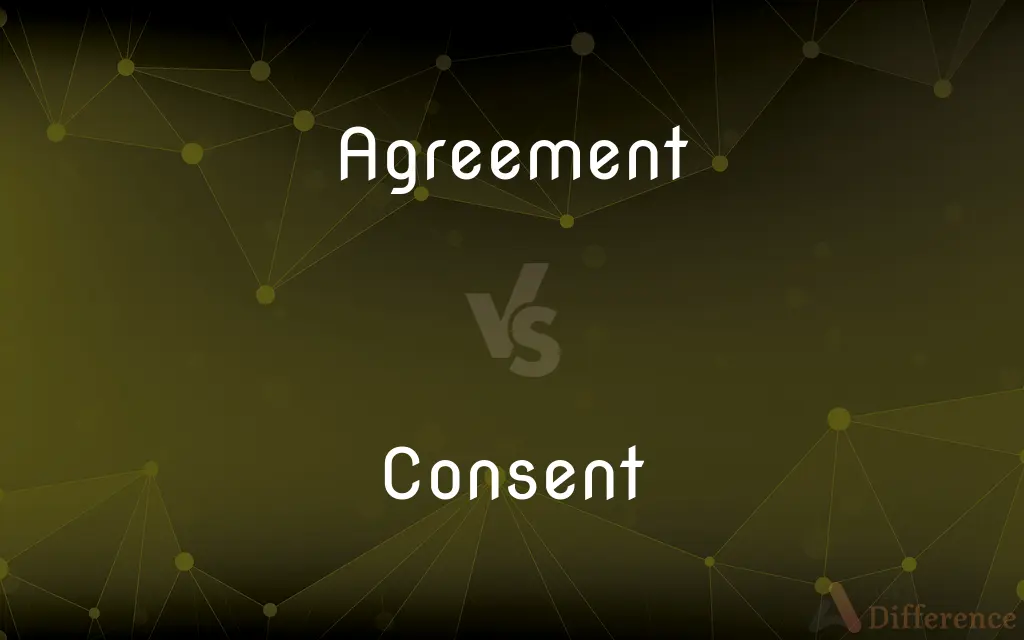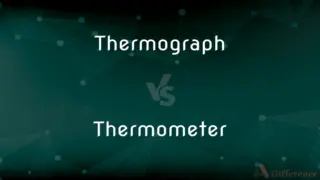Agreement vs. Consent — What's the Difference?
Edited by Tayyaba Rehman — By Urooj Arif — Updated on April 8, 2024
Agreement implies a mutual decision or understanding reached by two or more parties, while consent involves permission given by one party to another, often in a specific context.

Difference Between Agreement and Consent
Table of Contents
ADVERTISEMENT
Key Differences
Agreement and consent are both pivotal in various social, legal, and personal interactions but serve different purposes and imply different levels of involvement and acquiescence by the parties involved. Consent, however, specifically denotes the approval, permission, or assent given by one party to another. It is particularly significant in contexts that require explicit permission before proceeding with an action that affects another person.
An agreement is a mutual understanding or arrangement that is reached after some form of negotiation or discussion, where all parties involved have actively contributed to the terms and have a shared understanding or expectation of the outcome. It often involves a reciprocal exchange of promises or obligations and can be formalized in a contract. Consent emphasizes the autonomy of the individual giving it, indicating that they agree to what is being proposed or requested by another party.
While agreements often involve discussions, negotiations, and mutual concessions leading to a shared conclusion, consent may not require such a bilateral process. Instead, consent can be unilateral, with one party seeking approval or permission from another who holds the power to grant it. Consent must be informed, meaning the consenting party should fully understand what they are consenting to, and it should be given freely without coercion.
The concept of agreement can encompass a broader range of interactions and commitments between parties, from informal agreements based on trust to legally binding contracts. In contrast, consent is more narrowly defined and is deeply rooted in the respect for individual autonomy and the protection of personal rights and freedoms.
While both agreement and consent play crucial roles in interpersonal and legal relationships, they differ significantly in their application, with agreement focusing on mutual decisions and arrangements, and consent centering on permission and autonomy.
ADVERTISEMENT
Comparison Chart
Definition
A mutual decision or understanding reached by two or more parties.
Permission given by one party to another.
Involvement
Involves active participation and negotiation from all parties.
May not involve negotiation; focuses on one party granting permission to another.
Context
Can be formal or informal, and cover a wide range of interactions.
Often used in specific contexts requiring explicit permission.
Legal Significance
Can be binding, as in contracts, or non-binding, as in verbal agreements.
Essential for activities requiring legal or ethical permission.
Focus
On the mutual understanding and expectations.
On the autonomy and rights of the individual granting permission.
Requirement
Mutual consent and understanding of the terms.
Informed and voluntary assent.
Compare with Definitions
Agreement
A mutual understanding between parties about a specific set of arrangements.
They reached an agreement to share the profits equally.
Consent
Voluntary agreement to participate in an activity.
Consent forms were distributed to all participants.
Agreement
A formal document outlining the terms of a partnership.
The business partners signed a legal agreement.
Consent
Permission for something to happen or agreement to do something.
She gave her consent for the medical treatment.
Agreement
The act of agreeing on a decision or plan.
After lengthy discussions, an agreement was finally made.
Consent
The act of giving permission or approval.
The parent gave consent for the child's field trip.
Agreement
Consensus or concord in opinions or feelings.
There was an agreement among team members on the project direction.
Consent
Legal or formal agreement to terms and conditions.
Consent was required from all participants before the study commenced.
Agreement
An arrangement made between parties regarding a course of action.
The agreement included clauses for future disputes.
Consent
Acknowledgment and acceptance of a proposed course of action.
His consent to the agreement was obtained after thorough discussion.
Agreement
Harmony or accordance in opinion or feeling
The governments failed to reach agreement
The two officers nodded in agreement
Consent
Permission for something to happen or agreement to do something
No change may be made without the consent of all the partners
Agreement
The act of agreeing
When did the agreement take place?.
Consent
Give permission for something to happen
He consented to a search by a detective
Agreement
Harmony of opinion; accord
Since we are all in agreement, let's proceed.
Consent
To give assent, as to the proposal of another; agree
Consent to medical treatment.
Consent to going on a business trip.
Consent to see someone on short notice.
Agreement
An arrangement between parties, usually resulting from a discussion, regarding a course of action.
Consent
(Archaic) To be of the same mind or opinion.
Agreement
A properly executed and legally binding contract.
Consent
Acceptance or approval of what is planned or done by another; acquiescence.
Agreement
The writing or document embodying this contract.
Consent
Agreement as to opinion or a course of action
She was chosen by common consent to speak for the group.
Agreement
(Grammar) Correspondence in gender, number, case, or person between words.
Consent
(intransitive) To express willingness, to give permission.
After reflecting a little bit, I've decided to consent.
Agreement
(countable) An understanding between entities to follow a specific course of conduct.
To enter an agreement;
The UK and US negotiators nearing agreement;
He nodded his agreement.
Consent
To cause to sign a consent form.
Agreement
(uncountable) A state whereby several parties share a view or opinion; the state of not contradicting one another.
The results of my experiment are in agreement with those of Michelson and with the law of General Relativity.
Consent
To grant; to allow; to assent to.
Agreement
A legally binding contract enforceable in a court of law.
Consent
To agree in opinion or sentiment; to be of the same mind; to accord; to concur.
Agreement
Rules that exist in many languages that force some parts of a sentence to be used or inflected differently depending on certain attributes of other parts.
Consent
Voluntary agreement or permission.
Agreement
An agreeable quality.
Consent
(obsolete) Unity or agreement of opinion, sentiment, or inclination.
Agreement
State of agreeing; harmony of opinion, statement, action, or character; concurrence; concord; conformity; as, a good agreement subsists among the members of the council.
What agreement hath the temple of God with idols ?
Expansion and duration have this further agreement.
Consent
(obsolete) Advice; counsel.
Agreement
Concord or correspondence of one word with another in gender, number, case, or person.
Consent
To agree in opinion or sentiment; to be of the same mind; to accord; to concur.
And Saul was consenting unto his death.
Flourishing many years before Wyclif, and much consenting with him in jugdment.
Agreement
A concurrence in an engagement that something shall be done or omitted; an exchange of promises; mutual understanding, arrangement, or stipulation; a contract.
Consent
To indicate or express a willingness; to yield to guidance, persuasion, or necessity; to give assent or approval; to comply.
My poverty, but not my will, consents.
And whispering "I will ne'er consent," - consented.
Agreement
The statement (oral or written) of an exchange of promises;
They had an agreement that they would not interfere in each other's business
There was an understanding between management and the workers
Consent
To grant; to allow; to assent to; to admit.
Interpreters . . . will not consent it to be a true story.
Agreement
Compatibility of observations;
There was no agreement between theory and measurement
The results of two tests were in correspondence
Consent
Agreement in opinion or sentiment; the being of one mind; accord.
All with one consent began to make excuse.
They fell together all, as by consent.
Agreement
Harmony of people's opinions or actions or characters;
The two parties were in agreement
Consent
Correspondence in parts, qualities, or operations; agreement; harmony; coherence.
The melodious consent of the birds.
Such is the world's great harmony that springsFrom union, order, full consent of things.
Agreement
The thing arranged or agreed to;
They made arrangements to meet in Chicago
Consent
Voluntary accordance with, or concurrence in, what is done or proposed by another; acquiescence; compliance; approval; permission.
Thou wert possessed of David's throneBy free consent of all.
Agreement
The determination of grammatical inflection on the basis of word relations
Consent
Capable, deliberate, and voluntary assent or agreement to, or concurrence in, some act or purpose, implying physical and mental power and free action.
Agreement
The verbal act of agreeing
Consent
Sympathy. See Sympathy, 4.
Consent
Permission to do something;
He indicated his consent
Consent
Give an affirmative reply to; respond favorably to;
I cannot accept your invitation
I go for this resolution
Common Curiosities
Can consent be part of an agreement?
Yes, consent can be a component of an agreement, especially when the terms of the agreement require explicit permission from involved parties.
What is the key difference between agreement and consent?
The key difference is that an agreement involves mutual decision-making between parties, while consent involves one party giving permission to another.
Is a verbal agreement legally binding?
Verbal agreements can be legally binding, though proving the terms and obtaining enforcement can be more challenging than with written agreements.
Can consent be withdrawn?
Yes, consent can typically be withdrawn at any time, provided it is communicated clearly, especially in contexts where ongoing consent is required.
Can an agreement be enforced without a signature?
Yes, an agreement can be enforced without a signature if there is sufficient evidence to prove its existence and the intention of the parties to be bound by it.
What constitutes a breach of agreement?
A breach of agreement occurs when one or more parties fail to fulfill their obligations as outlined in the agreement.
What role does negotiation play in reaching an agreement?
Negotiation is a key process in reaching an agreement, allowing parties to discuss terms and make compromises to achieve mutual satisfaction.
Can a minor give consent?
Minors' ability to give consent varies by jurisdiction and context, with many laws requiring parental consent for decisions involving minors.
How do cultural differences impact agreements and consent?
Cultural differences can impact the perception and expression of agreements and consent, influencing communication styles and the value placed on formalities.
How does consent play a role in medical procedures?
Consent is crucial in medical procedures as it ensures patients are informed about and voluntarily agree to undergo specific treatments or interventions.
Why is informed consent important?
Informed consent is important as it ensures individuals are fully aware of and understand what they are consenting to, safeguarding their autonomy and rights.
What makes an agreement valid?
For an agreement to be valid, it generally needs to involve competent parties, mutual consent, a lawful object, and consideration.
Is it necessary to have written consent?
While not always legally required, written consent is often preferred as it provides clear evidence of the consenting party's approval and understanding.
How is consent expressed in legal documents?
Consent in legal documents is usually expressed through signatures, initials, or explicit acknowledgment clauses within the document.
What are some challenges in obtaining genuine consent?
Challenges include ensuring the consenting party has full understanding, is not under coercion, and is legally capable of giving consent.
Share Your Discovery

Previous Comparison
Monarchy vs. Anarchy
Next Comparison
Thermograph vs. ThermometerAuthor Spotlight
Written by
Urooj ArifUrooj is a skilled content writer at Ask Difference, known for her exceptional ability to simplify complex topics into engaging and informative content. With a passion for research and a flair for clear, concise writing, she consistently delivers articles that resonate with our diverse audience.
Edited by
Tayyaba RehmanTayyaba Rehman is a distinguished writer, currently serving as a primary contributor to askdifference.com. As a researcher in semantics and etymology, Tayyaba's passion for the complexity of languages and their distinctions has found a perfect home on the platform. Tayyaba delves into the intricacies of language, distinguishing between commonly confused words and phrases, thereby providing clarity for readers worldwide.
















































